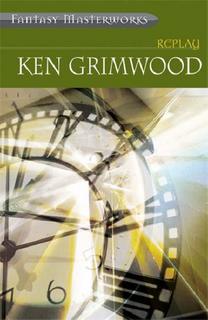 Jeff Winston dies at his desk in 1988, and regains consciousness in 1963 with all his former memories intact.
Jeff Winston dies at his desk in 1988, and regains consciousness in 1963 with all his former memories intact.This work is far more engaging than its formulaic premise would suggest. During his various reincarnations, the protagonist exploits his knowledge of future events by betting on sporting events, clears up on the stock market as the head of Future, Inc., indulges in libidinous excess, is co-opted into working for the government, and retires into rural isolation. Replaying his life eight times gives Winston the opportunity to experiment with relationships and forces him to come to terms with the fact that the pains of love and loss are ineluctable, whatever you try to do to avoid them.
The repeated strains of the narrative's emotional cadence are redoubled by Winston's discovery of a fellow 'replayer', Pamela Phillips, with whom he passes his latter reincarnations. Each replay begins later in their lives than the previous one, with Jeff having to wait for Pamela for months, then years, immersing them both in all the complications of their first life before they can deal with their present one. The day of their deaths, however, remains constant.
The book invites reflection on the brevity of life, the passing of time, and the value of human experience on numerous levels, and the protagonist engages (at least in passing) with many of the points of philosophical engagement that the work provokes. More than a Buddhist parable, Replay manages to engender in the reader a belief in their own ability to appreciate life's intrinsic value in each passing moment, to sense how every shard of our time is imbued with the uniqueness of individual experience, snatched from an infinity of silence. A painful but redemptive conclusion is followed by a thought-provoking epilogue which encourages the reader (to condense a couple of tropes that are themselves 'replayed' throughout the work) to soar on life's thermals.
I could have lived without the dolphins and the mandalas, but this is a truly rewarding work, and a worthy winner of the 1988 World Fantasy Award and a firm personal favourite amongst the Fantasy Masterworks I have read thus far.
